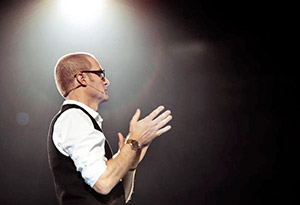Heaven is a Place on Earth: Rob Bell's Revolutionary Mission

Photo: Daley Hake
PAGE 3
Rob Bell believes the joy and riches of eternal life are available to everyone, right here, right now. He may be onto something. Register now for his eCourse.
Though he sometimes gives the impression that he floats on a plane high above religious (or self-) doubt, Bell's beliefs are hard won. He is the oldest of three children raised by "intellectually restless" Christian parents in Okemos, Michigan. At 22, after finding his calling, Bell moved to Pasadena, California, to attend Fuller Theological Seminary; Kristen, a good friend he'd met at Wheaton College, a Christian school outside Chicago, joined him, and they've been together ever since.
It was not long after starting his own fast-growing church that Bell suffered a crisis of faith. The pressure of thousands of people's eyes trained on him every Sunday caused him to question whether he was actually offering them anything useful. He didn't want to be a Christian just because he'd been born a Christian, so he studied progressive theological scholars and philosophers such as Dallas Willard, John Robinson, and Paul Tillich, and read as much as he could about other religions. And he ultimately found ways to read the Bible that spoke to him on a much deeper level—and that seemed much more helpful in his life.
When he published Love Wins, evangelical leaders objected loudly to his selective use of Scripture, charged him with historical inaccuracy and decried his "full-blown hell-is-empty-everyone-gets-saved universalism," as one blogger put it. Former MSNBC host Martin Bashir accused Bell of "amending the gospel...so that it's palatable to contemporary people." (Bashir later admitted that he attends a conservative evangelical church in Manhattan, but said his personal beliefs did not influence his interview.) One pastor described the theology behind progressives like Bell as the "last rung for evangelicals falling off the ladder into liberalism or unbelief." Time, in its cover story on the intrafaith brouhaha, suggested that Bell's Christianity was "more of an ethical habit of mind than a faith based on divine revelation." Some Christian bookstores refused to stock the book.
Today Bell greets the criticism with a shrug. "It's like refrigerator buzz," he says. "Some guy thinks we need to talk more about how God's angry? Like, whatever. It's just so boring!"
He is sitting in the courtyard of a minimalist motel on the beach, hosting an event called 2Days with Rob Bell. About 100 people, many of them pastors, have paid $500 to listen to him talk from roughly 9 a.m. to 9 p.m., with breaks for meals, on topics like leadership and the creative process. Unsurprisingly, time is flying by. He rocks back in his chair, grabs his legs behind the knees, and howls when he finds something funny. Sometimes he just jumps straight up into the air. You get the feeling he hosts these events just to burn energy. For hours on end, he cracks people up and sets them scribbling madly in their notebooks. He's wearing a trim short-sleeve, button-down shirt, slim-fitting jeans, and flip-flops, but he seems almost too outsize for this setting, this man who has held arenas of 60,000 now raining down his extraordinary juju on a comparative handful at close range. In addition to religious books and Scripture, he mentions Eddie Izzard, Christopher Hitchens, Jennifer Aniston, Mahmoud Ahmadinejad, ESPN The Magazine, Matt Damon, Bruce Springsteen, and the Kardashians. At one point he scrolls through his phone; he wants to show everyone a few of the pictures he's snapped recently, including one of a slick black Ferrari hogging two parking spots. "People are handing you content and truth and stories all the time," he says. "You have to have your radar on."
Bell thinks we are too busy worrying about salvation and questioning our worth to receive the love God presents to us in abundance every day—to feel the reverence humming within us. "I have one life," he tells the crowd. "My kids are all still at home. I get one shot at this." Bell will tell you that he believes in life after death—he hopes to one day see his grandfather, he told Oprah on Super Soul Sunday—but he also believes that our time on earth is what matters.
Someone in the audience asks, "How has it been, being out there, away from the church?" Bell cocks his head and pauses. "I am so happy," he says, actually tearing up a little. "I am so happy." Bell tells me later that he never Googles himself. "We enjoy our life and try to do good work and care for people and help if we can, and take care of ourselves."
The next day, at lunchtime, Bell tells the group that he's arranged for his friend James "Jamo" Pribram, who owns a surf school, to help us catch some waves. "You're about to be born again!" he cries. We stream out to the beach, most of us pale, from landlocked states, not in especially great shape. Bell's friends have hauled a bin of wet suits onto the sand, and they set about collecting waivers, arranging boards on the beach, and teaching us to spring upright on them from a prone position. Suddenly, there's Bell, strolling toward us, a black wet suit rolled down to his waist, a retro wood-veneer surfboard tucked under his arm. He has the freckled torso of a much younger man. He takes stock of our progress. Then he turns and peels toward the water, gliding effortlessly onto his board, paddling surely, leading his people into the vast ocean.
The water is freezing, but we soon forget. As we dodge the modest waves, a softly heaving current makes our feet dance on the rocks below. We squint in the sun, strangers, blessed on this day, clearly, by something.



